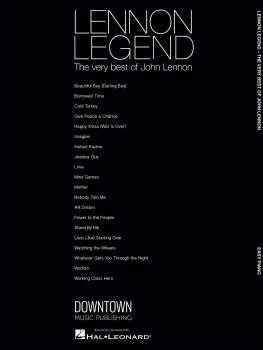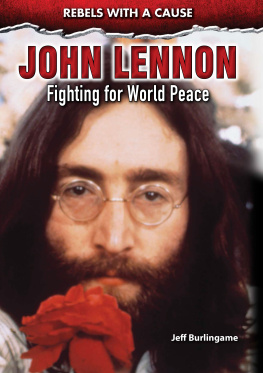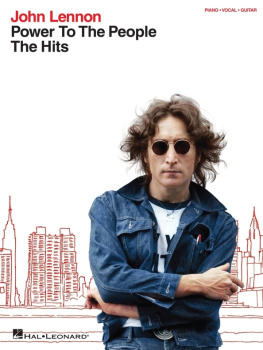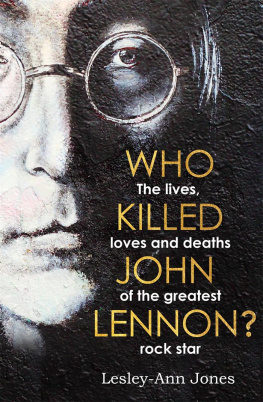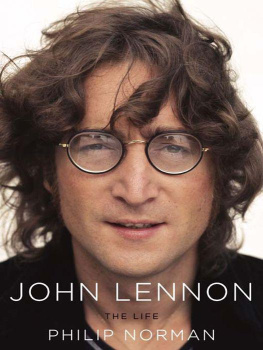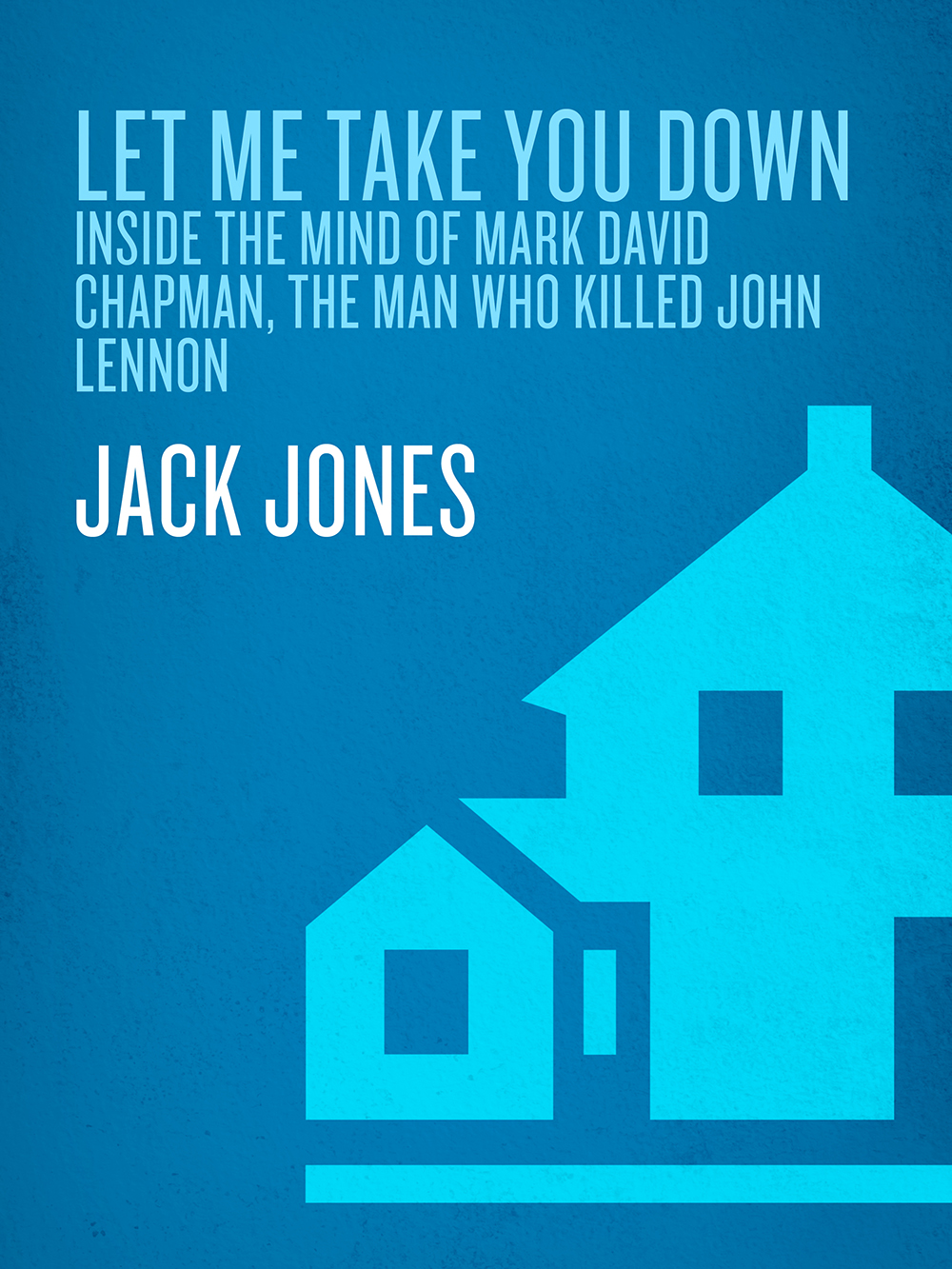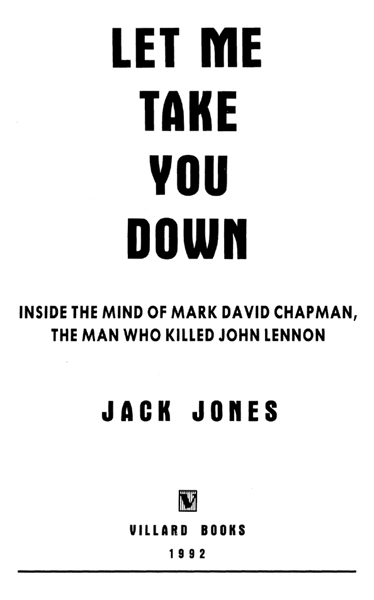Copyright 1992 by Jack Jones
The Prisoners Letter and untitled poem dated August 28, 1991, 1992 by Mark David Chapman
All rights reserved under International and Pan-American Copyright Conventions. Published in the United States by Villard Books, a division of Random House, Inc., New York, and simultaneously in Canada by Random House of Canada Limited, Toronto.
Villard Books is a registered trademark of Random House, Inc.
Library of Congress Card Catalog Number: 92-53655
eISBN: 978-0-307-77996-0
v3.1_r1
IN MEMORY OF HAROLD STEELE
A fool hath no delight in understanding, But that his heart may discover itself.
PROVERBS 18:2
The chapters that follow will show readers how a man in the grip of madness and malice was able to plan and carry out an assassination that virtually stopped the world. The work is based on more than two hundred hours of interviews with Mark David Chapman at Attica prison, supported by additional interviews with Chapmans wife and with former friends, therapists, and confidants.
The book re-creates a series of interactions between Chapman and people with whom he spoke before and after the killing of John Lennon. In each case, Chapmans memories of events have been corroborated by previously published material, personal diaries, police records, psychiatric reports, and/or personal interviews with the individuals with whom he conversed.
Chapmans encounters with Lennon fans, police, psychiatrists, and others in Georgia, Hawaii, and New York City are based on the killers memories and on material obtained under the Freedom of Information (FOI) Law from the New York County District Attorneys Office. Statements made to police investigators by Yoko Ono and other witnesses were likewise obtained from the DAs office under an FOI request. With Chapmans permission, several of his former psychiatrists and psychologists agreed to be interviewed and to provide transcribed material from their case records.
Some of the material on John Lennon was obtained under the FOI from extensive files that the FBI maintained during the rock stars nine years of residence in the U.S.
AUTHORS NOTE
After a series of meetings at Attica prison, Chapman asked the author to undertake the telling of his story in the hope that it might prevent future tragedy. Neither Chapman nor his family will receive any share of profits, royalties, or other financial or material benefits arising from this book.
ACKNOWLEDGMENTS
For help and advice in the preparation of this book, I wish to thank Jim Kurtz, Kris Bertelsen, Ed Sprigg, Bill Ward, Dr. David Barry, Dr. Duncan Stanton, and Phil Kiefer.
For their trust, love, and inspiration, I am forever indebted to the late Harold Steele, his wife, Dorothy, and Ken Siegel, cofounders of the Cephas-Attica organization.
I also wish to thank Attica superintendent Walter Kelly; deputy superintendent Tim Murray and his secretary, Lisa, for often allowing me into Attica prison on short notice; and the many correction officers who facilitated my visits with Mark David Chapman.
For sharing his collection of Beatles music, I thank Chris Warren. To Kevin Higley, who went out of his way to provide music, books, and other resource materials and to take photographs, I am especially grateful.
For their encouragement over the years, I wish to thank my colleagues and former colleagues in Rochester at The Democrat and Chronicle. Especially, I am grateful to the late Rick Tuttle and to Mark Wert, Phil Hand, David Dunkle, Barbara Henry, Claude Werder, Dennis Floss, Carol Ritter, and Lee Krenis More.
I shall be forever grateful to all those named in this book who agreed to be interviewed and to freely share their memories, diaries, medical reports, and legal paperwork.
Special mention is accorded to the librarians and volunteers at Wood Library in Canandaigua for invaluable research assistance. Thanks to Judy for helping to keep matters organized.
Most of all, for making an idea into a reality, I am indebted to Connie Clausen, my wonderful agent in New York City who agreed to handle a proposal from an unknown writer for a difficult book. In the end, it was Diane Reverand, my editor and publisher at Villard, whose patience, knowledge, and expertise made it all come together.
CONTENTS
PROLOGUE
The death of a man who sang and played guitar overshadows the news from Poland, Iran, and Washington tonight.
WALTER CRONKITE, CBS EVENING NEWS, DECEMBER 9, 1980
The world will not let go of the memories or music of John Lennon. More than a decade after a death as spectacular as his life, the artist who turned rock n roll into a worldwide crusade for peace and justice continues to be rediscovered, celebrated, and mourned by new generations of fans. Because of the historic dimensions of Lennons fame, one of his fans decided that he had to die.
Like John Lennon, Mark David Chapman was a child of his times who sought himself in drugs, music, art, poetry, religion, and literature. He, like Lennon, married an Asian woman about five years older than himself. He learned to play guitar, the instrument with which Lennon defined himself and captured the attention of the world. After all other instruments eluded his grasp, Chapman defined himself and got the worlds attention with a gun.
Chapman, like Lennon, was a troubled, self-absorbed, and emotionally unfulfilled child. Each came separately of ageLennon in the rubble of post-World War II England, Chapman in the midst of Americas divisive decade-long war in Vietnamin a confused and hypocritical world. Overcoming abandonment and rejection by both his parents, Lennon etched his image in poetry and music upon the consciousness of an era. Desperate for recognition, Chapman finally smeared his name in Lennons blood upon the soul of the troubled times.
The killer said, It almost seems like something that had to happen.
Lennon, as well, seemed to foretell his violent death as something that had to happen. In radio and magazine interviews he talked repeatedly of the assassinations of public figures who, like he, had spoken out against the evils of war, racial bigotry, sexual discrimination, and other forms of social injustice. He talked in numerous interviews of the steps he believed he had taken to avoid a similar destiny: So I refuse to lead, he told a reporter, and Ill always show my genitals or something which prevents me from being Martin Luther King or Gandhi and getting killed.
Lennon urged his fans and followers to look within themselves for the answers to such tragedies: The struggle is in the mind, he said. We must bury our own monsters and stop condemning people. We are all Christ and we are all Hitler.
In prison, Chapman has received thousands of letters from John Lennon fans all over the world. Many confide to the killer that theyve been unable to bury their own monsters and come to grips with the violent death of a man whose music and poetry caused them to imagine a warring world at peace.
Both Lennon and his assassin have shaken and forever altered twentieth-century history. The assassination was an abrupt coda to an age still in search of itself. When he shot John Lennon, Chapman robbed us all of an opportunity to better understand ourselves.
This is the story of how Mark David Chapman, unable to find meaning or hope in his own life, conceived and carried out the assassination of a musician who embodied a universal search for truth. The story is dedicated to Harold Steele, who founded the Cephas-Attica prisoner rehabilitation program after forty-three men died in the bloodiest prison uprising in American history in September 1971. Steele died suddenly of a heart attack on November 30, 1989, at the age of forty-six.




